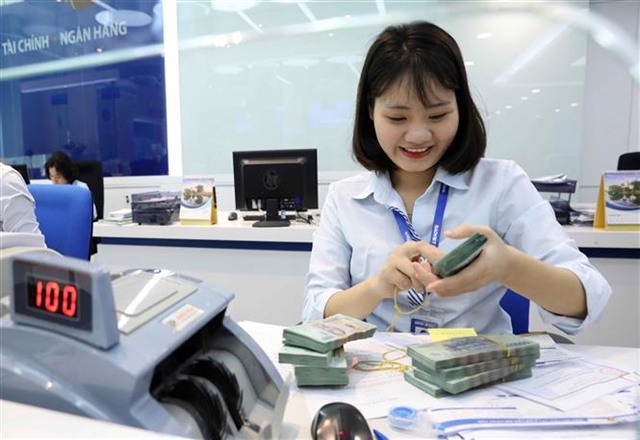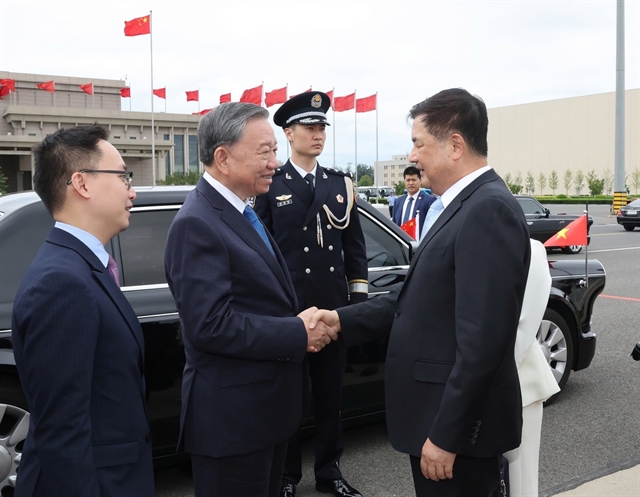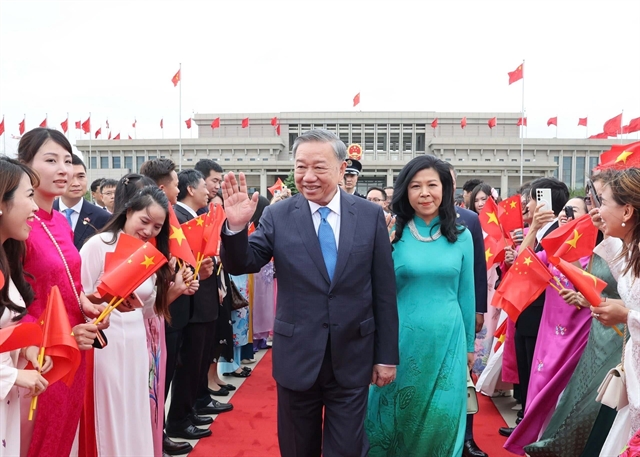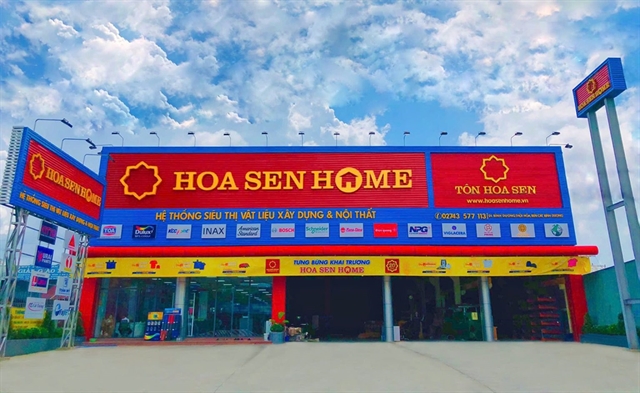 Politics & Law
Politics & Law


|
| State Councillor, Minister of Public Security of China Wang Xiaohong (right) bids farewell to Việt Nam's Party General Secretary and President Tô Lâm on Tuesday at the Beijing International Airport. — VNA/VNS Photo Trí Dũng |
HÀ NỘI — General Secretary of the Communist Party of Việt Nam (CPV) Central Committee and State President Tô Lâm, along with his wife and the high-level Vietnamese delegation, returned to Hà Nội Tuesday afternoon, successfully concluding a State visit to China, at the invitation of Chinese counterpart Xi Jinping and his wife.
At Beijing International Airport, the Vietnamese delegation was seen off by Chinese officials, including Wang Xiaohong, Secretary of the Party Secretariat, State Councilor, and Minister of Public Security; Chinese Ambassador to Việt Nam Xiong Bo; and officials from the Chinese Ministry of Foreign Affairs. Also at the airport were the Vietnamese Ambassador to China Phạm Sao Mai and his wife, embassy staff and representatives of the Vietnamese community and students in China.
During the visit, Vietnamese Party General Secretary and President Tô Lâm held talks with Chinese Party General Secretary and President Xi Jinping, witnessed the signing of cooperation agreements between the two countries, attended a tea banquet and met with high-ranking Chinese officials including Zhao Leji, Chairman of the Standing Committee of the National People's Congress; Wang Huning, Chairman of the Chinese People's Political Consultative Conference; and Premier Li Qiang.

|
| Vietnamese top leader Tô Lâm and his wife leaving Beijing on Tuesday. — VNA/VNS Photo Trí Dũng |
He also met with the Secretary of the Guangdong Provincial Party Committee, interacted with Chinese friendship representatives, visited the Mao Zedong Memorial Hall, worked at the Central Party School of the Communist Party of China, and toured MEGVII Company.
As part of the visit, the delegation also laid flowers and offered incense in memory of Martyr Phạm Hồng Thái at the Huanghuagang Mausoleum Park and visited the Việt Nam Revolutionary Youth League headquarters site in Guangzhou, Guangdong Province. They also visited the Vietnamese Embassy and met with the Vietnamese community in China.
During talks and meetings, both sides exchanged views on the current situation of their respective parties and countries, achieving significant common understandings on Việt Nam-China relations and the current international and regional situation. On this occasion, 14 cooperation agreements were signed between various committees, ministries, sectors, and localities.
The two General Secretaries and Presidents agreed to strengthen political trust, maintain regular exchanges and contacts between the senior leaders of both parties and countries, and underscore the strategic guiding role of the Party channel in overall bilateral relations. They also agreed to deepen theoretical cooperation, share the latest theoretical and practical achievements, and contribute meaningfully to the work of both parties and countries.
Both sides agreed to further strengthen cooperation in security, defence and economic and trade investment, including promoting the connection between the "Two Corridors, One Belt" initiative and China's Belt and Road Initiative, enhancing infrastructure connectivity in railways and roads, boosting supply chain cooperation, and economic cooperation between border provinces. China affirmed its readiness to increase imports of Vietnamese agricultural products, expand trade promotion offices in China, and facilitate access to high-quality Vietnamese agricultural products in the Chinese market.
The two sides also stressed the importance of enhancing people-to-people exchanges, fostering understanding and friendship between the two peoples, especially among the younger generation, and agreed to designate 2025 as the "Việt Nam-China Cultural Exchange Year".
The two General Secretaries and Presidents exchanged views on various international and regional issues of mutual concern, emphasising coordination and mutual support at multilateral forums and international mechanisms, based on the legitimate interests of both countries and contributing positively to the common interests of the international community. — VNS




